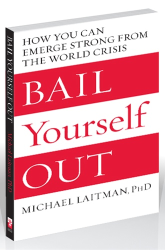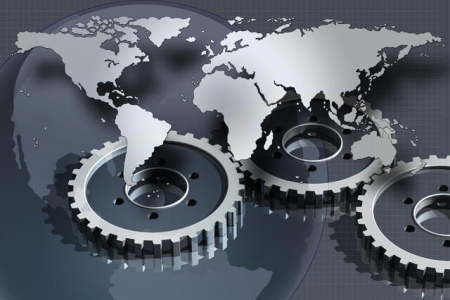Why Today Nature Is the Only Role Model for Humanity
Today humanity is gradually sinking deeper and deeper into a multi-faceted global crisis. It doesn’t seem there is antibody who has true solutions, or ideas how correct the multitude of mistakes.
The surest way to correct mistakes is to learn from those who have done things right. In this case, nature is our role model and a proven success, so she should be our teacher.
To see how we can let the desire to give into our lives, let’s look at how nature does it. We perceive the outside world by using our senses, and we believe that the picture of reality our senses provide is accurate and reliable. But is it?
How often do we walk with a friend, and the friend hears something that we miss? Well, just because we didn’t hear that sound doesn’t mean there was none. All it means is that our senses didn’t pick it up, or that we didn’t pay attention. Or maybe our friend was hallucinating!
In all three possibilities, the objective reality is the same, but our perception of it is not. In other words, we do not know what the actual reality is like, or if it even exists. All we know is what we perceive of it.
So how do we perceive? We use a process best described as “equivalence of form.” Each of our senses responds to a different type of stimulus, but all our senses work in a similar manner. When a ray of light, for instance, penetrates my pupil, the neurons in my retina create a model of the outside image. This model is then encoded and transferred to my brain, which decodes the pulses and reconstructs the image. A similar process occurs when a sound hits our eardrums or when something touches our skin.
In other words, my brain uses my senses to create a model or form equal to the outside object. But if my model is inaccurate, I will never know it and will believe that the actual object or sound is the same as the model I created in my mind.
Discover the Best Step to Take to Better Perceive Reality
The “equivalence of form” principle applies not only to our senses, but to our behavior, as well. Children, for example, learn by repeating behavior they see in their surroundings. We call this “imitation.” Eager to learn about the world they were born into, and having no language skills, children use imitation as a means to acquire skills such as sitting and standing, speech, and use of cutlery. When we speak, they watch how we move our lips. This is why parents are advised to speak clearly to children (but not loudly; they can hear better than we). By imitating us, children create the same forms (movements or sounds) as we do, and thus learn about the world they live in.
In fact, not only do children learn that way, but the whole of nature is a testimony to the efficiency of learning through equivalence of form. It is thrilling to watch lion cubs play. They crouch in ambush, attacking each other with the enthusiasm of youth. They stalk everything from shadows to insects to antelopes. There is little danger of their actually catching anything at this stage, but for them, stalking is not mere play. By assuming the role of hunter, they act out a function they will have to execute very seriously as adults. Acting is how they bring the hunter within them to life. Without it, they will not survive because they will not know how to bring down the prey that will feed and sustain them.
If we wish to perceive the desire to give, all we need do is to create an image of it within us. If we pay close attention to our thoughts and desires while performing acts of giving, we will discover within us a desire that is equal to the desire to give that exists in nature. Then, as naturally as children discover speech by emulating sounds and syllables, we will discover the desire to give by emulating giving.
It may take a while before we know how to balance receiving and giving as nature does it, but practice makes perfect and we will succeed. And when we have done so, our lives will be a boundless flow of revelations so profound and rich we will be in awe at how blind we could have been thus far.
To Unite or Destroy One Another, the Choice Is in Our Hands
In today’s world, we can no longer be oblivious to the workings of the desire to give. We are not in Babel, where people could avoid friction between them by moving away and spreading to the outlands. Because we have populated every corner of the globe, we have nowhere to go. In addition, we have connected ourselves so tightly to each other that it would be easier to unscramble scrambled eggs than to undo our global connections.
And this is not a bad thing. Without global connections, where would we get such inexpensive goods as those provided by China and India? And who would give work and bread to the workers in those countries? Now that the world economy is going through a mammoth downturn, we can see how beneficial globalization can be if we use it properly.
Actually, the world is the same megalopolis that it was in the times of Babel, but now we are that megalopolis on a global scale. We cannot disperse, so we must either unite or destroy each other. We are a single whole, one body, and we must learn to act the part. The more we put off doing so, the less healthy we and our society will become.
So, to avoid destroying each other, let us all resolve that we are going to come out of this crisis together.
Introducing the Bright Future of Media, Sunglasses Optional
To succeed on a global scale, we need a global means of communication to communicate the concept of togetherness. To this end, we will now take a look at the media.
The media must play a key role in shifting the public atmosphere from alienation to camaraderie. The media provides us with almost everything we know about our world. Even the information we receive from friends or from family usually arrives via the media. It is the modern version of the grapevine.
But media does not simply provide us with information. It also offers us tidbits about people we approve or disapprove of, and we form our views based on what we see, hear, or read on the media. Because its power over the public is unrivaled, if the media turns to togetherness and unity, the world will follow.
Regrettably, until the outbreak of the financial crisis, the media has been focusing on successful individuals, media moguls, mega pop stars, and ultra-successful individuals who made millions and billions at the expense of their competitors. Only recently, as an offshoot of the crisis, has the media begun to display acts of compassion and unity, such as the sandbagging efforts by thousands of volunteers in Fargo, North Dakota, who joined forces in March, 2009 to stop the highest cresting of the Red River in recorded history.
While this trend is certainly welcome, a few sporadic and spontaneous efforts are not enough to truly bring people together. To really change our worldview, to make us aware of the existence of the desire to give, the media should present the full picture of reality, and inform us of its structure. To this end, it should create programs that demonstrate how the desire to give affects all levels of nature—inanimate, vegetative, animate, and human—and encourage people to emulate it. Instead of talk shows that host people who only talk about themselves, why not host people who praise others? After all, such examples abound; we just have to acknowledge them and bring them to the public’s attention.
If the media shows people caring for each other, and explains that such images will help us let the giving force into our lives, it will shift the public’s focus from self-centeredness to camaraderie. Today, the most popular viewpoint should be, “Unity is fun—let’s join the party.”
What Positive Media Can Do for You,and You,and You
Indeed, globalization is a fact, and it is showing us that we are already united. We can try to resist it, or we can join in and benefit from the diversity, opportunities, and abundance that globalization has in store for us.
There are ample ways the media can show us that unity is a gift. Although every scientist knows that no system in nature operates in isolation and that interdependency is the name of the game, most of us are unaware of it. When we see how every organ works to benefit the whole body, how bees collaborate in hives, how a school of fish swims in such unison that it can even be mistaken for a giant fish, how wolves hunt together, and how chimpanzees help other chimps, or even humans, without any reward in return, we will know that nature’s primary law is harmony and coexistence.
The media can and should show us such examples far more often than it does. When we realize that this is how nature works, we will spontaneously examine our societies and see if they are in unison with this harmony.
If our thoughts begin to shift in this direction, they will create a different atmosphere and introduce a spirit of hope and strength into our lives, even before we actually implement that spirit. Why? Because we will be aligned with nature’s life force—the desire to give.
The more connected we feel to others, the more our happiness depends on how they feel about us. If others approve of our actions and views, we feel good about ourselves. If they disapprove of what we do or say, we will feel bad about ourselves, hide our actions or even modify them to suit the social norm. In other words, because it is so important for us to feel good about ourselves, the media is in a unique position to shift people’s actions and views.
Not surprisingly, politicians are the most ratings-dependent people on earth, as their very livelihood depends on their popularity. If we show them that we have changed our values, they will change theirs to follow our lead. And one of the easiest, most effective ways to tell them what we value is to show them what we want to watch on TV! Because politicians want to stay in office, we need to show them that if they want to retain their positions, they must promote what we want them to promote—unity.
When we are able to create media that promotes unity and collaboration instead of self-glorification of celebrities, we will create an environment that persuades us that unity and balance between the desires are good.
 “How Nature’s Example Is Perfect and Following It Will Resolve Every Crisis” is based on the book, Bail Yourself Out: How You Can Emerge Strong from the World Crisis by Dr. Michael Laitman.
“How Nature’s Example Is Perfect and Following It Will Resolve Every Crisis” is based on the book, Bail Yourself Out: How You Can Emerge Strong from the World Crisis by Dr. Michael Laitman.

